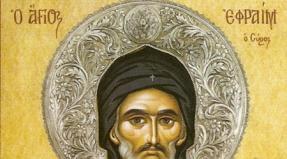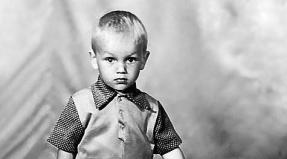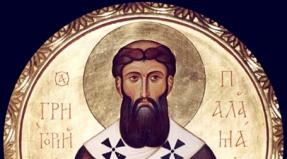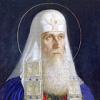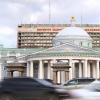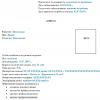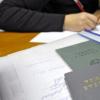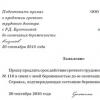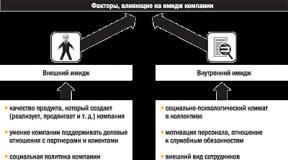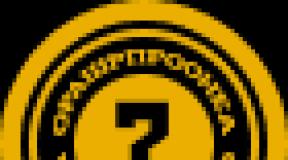Dunno on the Moon is a brilliant work about capitalist society. Dunno and other extremists Nikolai Nosov Dunno on the Moon extremism
The administrator of the Radical Dreamers public on VKontakte, Mikhail Malakhov, was summoned for a conversation because of a post with a quote from the book “Dunno on the Moon” not to the prosecutor’s office, as previously reported, but to the Center “E”. Malakhov himself reported this to Novaya Gazeta.
The blogger explained why he misled people. “I was confused. Yes, I really did not receive calls from the prosecutor's office, but from the police. And they were not invited to the prosecutor's office, but to the Center for Countering Extremism. That is why the prosecutor's office naturally denied the information, ”Malakhov said.
The blogger stressed that "the call was unexpected" and he did not ask who was calling him. “I really fell into a kind of stupor. And this employee, as far as I remember, did not introduce himself. I, in any case, do not remember any of his data. We talked a little, and he gave me the address where he was waiting for me. But since I was a little confused, I only remembered that this is Dzerzhinsky Street, which intersects with something there. After the conversation, I googled and saw that there is a prosecutor's office at 8 Dzerzhinsky, but later it turned out that it was there, but then it was moved. And on Dzerzhinsky, with the intersection of some other street, there really is a Center “E”, ”explained Malakhov.
Radio Liberty contacted the police officer who called Malakhov. He said that at the request of a certain citizen "from another subject of the Federation", a check is being carried out to determine whether the quote from "Dunno on the Moon" is extremist.
Earlier, the prosecutor's office of the Krasnodar Territory had summoned Malakhov for interrogation. “Indiscriminately accused the law enforcement agencies, the eye of the sovereign,” the press service of the regional prosecutor’s office told Meduza. The department explained that they deliberately called all the regional prosecutor's offices of the region and found out that they had not heard of Malakhov in any of them and "have no complaints against him."
Earlier, Mikhail Malakhov, that he was summoned for interrogation to the prosecutor's office because of a fragment from Nikolai Nosov's book "Dunno on the Moon", which he posted in his public "Radical Dreamers". Allegedly, there he was told that they had received a statement with a request to check the post with a quote from Dunno for inciting hatred towards the social group “policemen” (Article 282 of the Criminal Code).
Malakhov said that he asked the caller if he really wanted to get an explanation from an excerpt from a children's fairy tale. To which he replied that a linguistic examination would figure it out. The caller did not specify whether the case was opened, and in what status he was going to talk with Malakhov.
A post with a screenshot of a quote from the 31st chapter of Nikolai Nosov's book "Dunno on the Moon" was published back in March. It contains, for example, the following words: “Who are these policemen? - asked the Herring. - Bandits! - said Kolosok with irritation. "
On the morning of October 10, the Radical Dreamers community had less than 300 subscribers; by the time the news was written, their number had increased to 1.5 thousand people.
The administrator of the Krasnodar public "Radical Dreamers" on the social network "VKontakte" Mikhail Malakhov was summoned for questioning to the regional prosecutor's office on suspicion of extremism. The reason was the screenshot he published from the book of the famous children's writer Nikolai Nosov, according to "Open Russia".
The post in question was posted to the group on March 28, 2017. It contains a page from the 31st chapter of the book "Dunno on the Moon" published in 1964. In the excerpt, the characters Herring, Cog, and Spikelet are discussing the police. Kolosok indignantly calls them "bandits" who, instead of protecting the population from robbers, "only protect the rich" who rob people, "hiding behind the laws that they themselves come up with." When Vintik asked why the inhabitants obey the police and the rich, Kolosok explains: "Try not to obey, when they have everything in their hands: land, factories, money, and, in addition, weapons!"
Malakhov himself reported on the social network about a call to the police last week. 
 The prosecutor's office said that Malakhov was summoned for interrogation, as the department received a statement with a request to check the mentioned post for inciting hatred towards the social group "police" (Article 282 of the Criminal Code).
The prosecutor's office said that Malakhov was summoned for interrogation, as the department received a statement with a request to check the mentioned post for inciting hatred towards the social group "police" (Article 282 of the Criminal Code).
“When I heard this, I was discouraged and asked again: 'Do you want to get an explanation from an excerpt from Dunno? Does he incite hatred of the cops? Are you serious? "To which the investigator answered me dryly:" A linguistic examination will figure it out, "the blogger told Open Russia.
According to Malakhov, he promised that he would go to the prosecutor's office "next week." The blogger admitted that he does not even know yet whether he will respond to the invitation. “But somehow I don’t want to be without a lawyer,” he added.
As Mikhail Malakhov, who is engaged in helping people to receive penalties from developers through the Society for the Protection of Consumer Rights, said, the Radical Dreamers public is a hobby for him. “We still don't get imprisoned for dreams, even if they are radical. This is a public page about a little bit of everything, it publishes what seems interesting to me and what may be interesting to others, ”the blogger said.
Malakhov noted that he had never participated in opposition rallies; rather, on the contrary, he wrote articles for “anti-Maidans,” led the LDNR group on a commercial basis, and published on Russia Today and Life.ru. Now, according to Malakhov, he became disillusioned with what he was doing before.
That he was summoned to the police for a post with a quote from Nikolai Nosov's book "Dunno on the Moon", which was considered "extremist." True, not at the initiative of the police, but at the request of a certain citizen "from another constituent entity of the Federation" who was concerned about this very possible extremism. Moreover, the vigilant citizen took care of it with a great delay, because the post with a scanned quote from the 31st chapter of "Dunno on the Moon" and an illustration by Heinrich Valk was published on March 28th. In the fragment of the novel given by Malakhov, the inhabitant of the Moon Spikelet, in a conversation with an earthly guest, Herlochka, calls the local law enforcement officers "bandits".
"Indeed, the duty of the police is to protect the population from robbers, in reality, they only protect the rich. And the rich are the real robbers. They only rob us, hiding behind the laws that they themselves come up with."
The same quote from "Dunno on the Moon"
This is not the first time that seemingly completely harmless and well-known works of art have caused the "concern" of some individuals and even entire organizations, leading to the intervention of supervisory authorities. Let's try to imagine what kind of fabulous or fantastic books could cause a similar reaction.
Gianni Rodari "The Adventures of Cipollino"
Content: the hardened extremist Cipollino commits an act of violence against an official and justly carries the punishment for this in the form of imprisonment. However, he continues to slander certain social groups, officials and the state. His son, young Cipollino, participates in a conspiracy that leads to the overthrow of the legitimate authority of Prince Lemon.

Signs of extremism:
- incitement of social discord;
- obstruction of the legitimate activities of state bodies (in the form of tax evasion and opposition to renovation);
- a description of the extremist as a positive hero;
- encouraging children to an immoral lifestyle.
From the protocol:
"The prisons are built for those who steal and kill, but Prince Lemon has the opposite: thieves and murderers are in his palace, and honest citizens are in prison."
"- My subjects need entertainment, - decided Prince Lemon, - then they will have no time to think about their troubles and needs."
Gianni Rodari "Jelsomino in the Land of Liars"
Content: Irresponsible adults keep the boy Jelsomino out of the house. He ends up in the Land of Liars, where, at the behest of King Giacomon (unprovenly named a former pirate), all citizens, in accordance with the existing legislation, are obliged to lie. The illegal migrant Jelsomino, together with local declassed elements, are plotting against the head of a sovereign state, inflicting a treacherous blow on his authority, which leads to a "color" revolution.

Signs of extremism:
- cruel treatment of minors;
- vagrancy;
- illegal border crossing;
- defamation of a senior official;
- slandering the information and ideological policy of the state;
- violent change of the constitutional order;
- a description of the extremist as a positive hero.
From the protocol:
"There is a law in the Land of liars: whoever does not lie is unwell."
"They are all so used to lying that they couldn't just admit they were scared."
Yuri Olesha "Three Fat Men"
Content: Declassed elements of Prospero and Tibulus incline to high treason the representative of the working intelligentsia Gaspar Arneri. The conspirators are plotting against the legitimate government by involving minors Tutti and Suok in their criminal activities. Through anti-state propaganda and slander against the social group "fat men", the criminals manage to lure the military over to their side, who overthrow the legitimate government.

Signs of extremism:
- violent change of the constitutional order;
- incitement of hatred towards the social group "fat men";
- involvement of minors in criminal activity;
- propaganda of a military coup;
- description of extremists as goodies.
From the protocol:
"A terrible night has come for the rich and the fat."
Astrid Lindgren. "The Kid and Carlson Who Lives on the Roof"

Signs of extremism:
- the overthrow of family values (propaganda of the "Swedish family");
- pedophilia;
- propaganda of an immoral lifestyle;
- propaganda of violation public order(hooliganism);
- involvement of minors in life-threatening actions (roofing);
- encouraging unconventional behavior.
From the protocol:
"In the city of Stockholm, on the most ordinary street, in the most ordinary house, lives the most ordinary Swedish family named Svanteson."
"If people knew how pleasant it is to walk on rooftops, they would have stopped walking the streets long ago."
J.K. Rowling "Harry Potter"

Signs of extremism:
- propaganda of obscurantism and occultism;
- involvement of minors in sects of the Satanist type;
- discrediting Christian values;
- participation of minors in illegal activities;
- the creation of illegal armed groups;
- propaganda of cruelty and violence.
From the protocol:
"I can move things without touching them. I can make animals do what I want, without any training. If someone makes me angry, I can make something bad happen to him. I can hurt a person, if I want. "
Arkady and Boris Strugatsky "It is difficult to be God"

Signs of extremism:
- discrediting the head of state;
- defamation of officials;
- propaganda of terrorism;
- incitement of social discord towards the ruling class;
- incitement to religious discord;
- obstruction of the lawful activities of state bodies;
- disobedience to law enforcement officers;
- a description of the foreign agent as a positive character.
From the protocol:
"The truth is that which is now in the good of the king. Everything else is a lie and a crime."
"No state can develop without science - it is destroyed by neighbors. Without arts and general culture the state loses its capacity for self-criticism, begins to encourage erroneous tendencies, begins to breed hypocrites and scum every second, develops consumerism and arrogance in its citizens, and in the end again becomes a victim of more prudent neighbors. "
John R.R. Tolkien "The Hobbit"
Content: gnome adventurers (with the involvement of a hobbit and a human), by prior conspiracy, form an organized criminal group with the aim of entering the house of citizen Smaug in order to illegally seize from him the valuables acquired during the years of initial capital accumulation. Their irresponsible actions bypassing the existing legislation lead to large casualties and destruction.

Signs of extremism:
- propaganda of criminal acts (theft with penetration into the home);
- creation of an ethnic organized criminal group;
- extrajudicial confiscation of valuables;
- propaganda of violence and cruelty;
- step-by-step instruction to carry out theft.
From the protocol:
"Dark deeds must be done in the dark."
As you can see, if you want to, almost any book and film can be summed up as extremism. Let's hope that common sense will prevail and such lists will never become reality.

